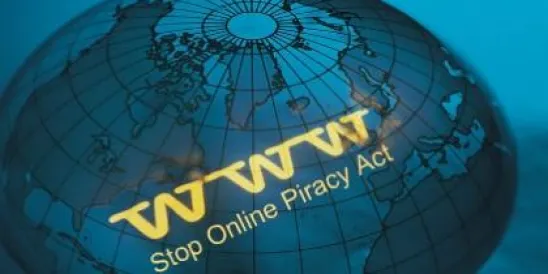From the Arab Spring to the Occupy Wall Street movement, 2011 was a year of protests. It was capped off with a little-covered (by traditional media) but important protest that will carry on into 2012. We’ll call it the “Pioneers Strike Back” movement of Internet entrepreneurs. The issue is a piece of controversial legislation pending before Congress — H.R. 3261, commonly known as the Stop Online Piracy Act, or SOPA.
The bill, which is supported by Hollywood, major media companies, and labor unions – along with many corporate monoliths – is supposed to combat copyright and trademark infringement over the web. The general tactic is to create new causes of action against websites for facilitating intellectual property violations. The problem is that the legislation is so broad that it could change the dynamics and use of the Internet as we know it. And in the process, it could run roughshod over the Constitution – undermining free speech and due process.
Through a notice and cutoff system, SOPA would allow private parties to effectively shut down any supposedly infringing site based merely upon the rights-holder’s allegations. For instance, a rights-holder could require payment processors and advertising networks to sever ties with an allegedly infringing site upon a five-day notice. Any subsequent determination by a court in favor of the alleged infringer could be too little, too late.
And SOPA goes even further: Service providers would be forced (for their own protection) to shut down entire domains, without regard to the content of each specific site.
Also troubling is the evisceration of safe harbors for websites established under the Digital Millennium Copyright Act. The DMCA limited websites’ responsibility to monitor content posted by users. Under SOPA, so long as a site is determined to “facilitate” infringing behavior, it could be considered liable under the law. So Facebook could find itself in hot water for something a user posted on his or her Facebook profile. The law, therefore, would require websites to institute policing measures to avoid liability. The law would also make it hard for smaller, emerging services to stay clear of litigious online entities that may constantly challenge the new sites’ content and/or architecture.
The prospective law’s measures risk stifling speech and innovation. Moreover, as many have pointed out, it could institute a framework for government censorship. (See an interesting review of this by the Cato Institute.)
These concerns over SOPA, along with concerns about potential cyber security and stability risks, have been written about extensively across the web and have been addressed to Congress. Most compelling is an open letter to Congress signed by 100+ law professors who express concern about both technological and constitutional infirmities of the law.
But the legislation, with some 31 co-sponsors, may very well make its way through committee to a potentially successful House vote. The reason would be the extensive big business backing of the bill. A non-exhaustive list of supporters identifies major players such as the Chamber of Commerce, News Corp., CBS, Viacom, MasterCard and Visa, and the Teamsters Union, just to name a few (some strange bedfellows, by the way!). In the world of political currency, the deep pockets that support the bill are formidable competitors. OpenCongress.org provides detail by identifying which deep pockets are supporting which congressmen.
SOPA supporters argue that the legislation is important to protecting intellectual property. The Chamber of Commerce, for instance, has estimated that online piracy costs U.S. companies roughly $135 billion a year. Detractors have a very different take on the economic – and non-economic costs – of the legislation.
Fortunately, all hope is not lost. Internet pioneers and entrepreneurs have been actively countering supporters of the bill. GoDaddy, which initially supported the bill, was “encouraged” to change its position after a registrant rebellion incited by Reddit.com. RedState.com is going after supporting legislators. And, best of all, major online presences like Google, Facebook, Yahoo!, and Amazon are taking a stand against the legislation, even considering the “nuclear option” of temporarily shutting down their services in protest. Yahoo! is rumored to have declined to renew its membership to the Chamber of Commerce in response to the group’s support of the bill. There is speculation that Google will do the same. Hopefully these moves will signify success for the Pioneers, and not the Empire.



 />i
/>i
